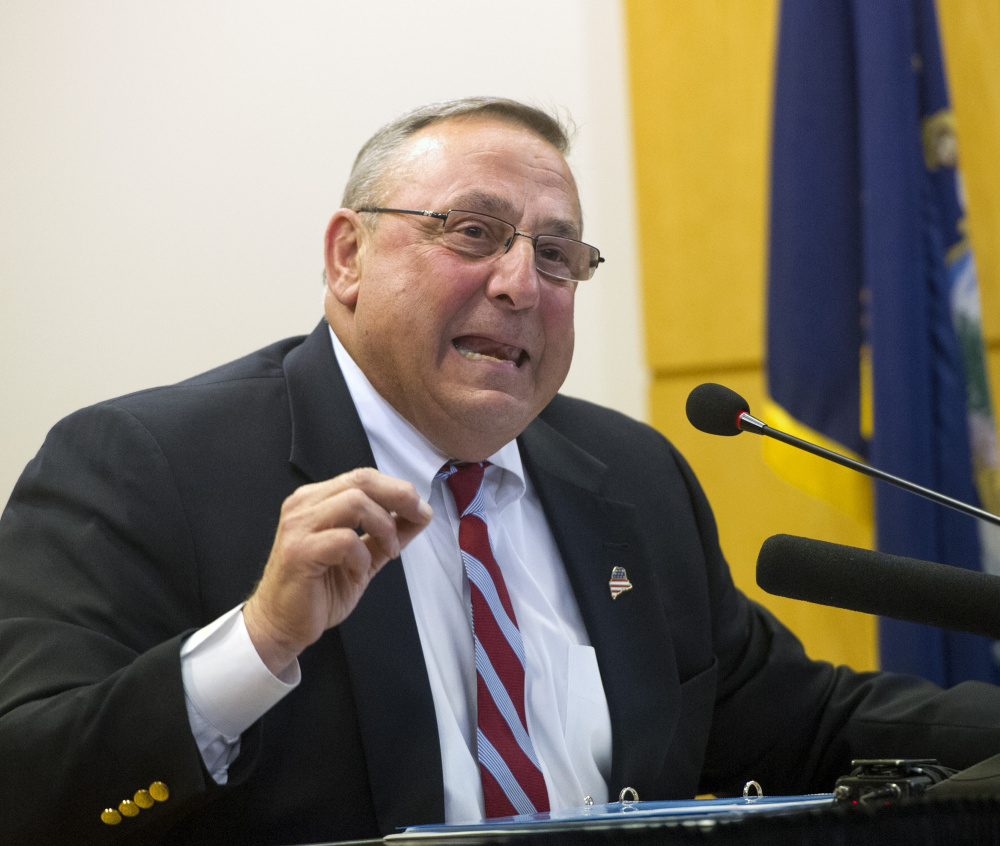AUBURN — Gov. Paul LePage railed against Question 1 on the statewide ballot on Wednesday night, telling several dozen people at a town hall meeting that the proposed expansion of Maine’s public campaign finance system is “a scam” and “a boondoggle” that will not reduce money’s influence on politics.
“If that passes, wow, you’re the most gullible population in the state,” LePage said. “This (question) is a scam. It does absolutely nothing to get big money out of this.”
Question 1 supporters, in turn, suggested LePage and opponents were “stooping to desperate levels to mislead voters.”
LePage made his comments during an informal, low-key event attended by about 50 people on the campus of Central Maine Community College in Auburn. Unlike at some past town halls, LePage had a friendly crowd and received no critical questions from the audience.
The governor spent much of the meeting focused on what he argues are the four top priorities for improving the state: reducing the income tax, lowering energy costs, reforming welfare and addressing the student loan debt crisis.
LePage said those steps are key to attracting new jobs and younger blood to a state that ranks among the oldest in the nation and where the death rate exceeds the birth rate.
“We need to lower the age of our population … and grow the population,” LePage said. “We are a society in Maine that is not suffering from overpopulation.”
LePage also accused some of his favorite targets – the Legislature and the media – of resisting his administration’s priorities. In fact, his decision to hold weekly town hall meetings around the state was largely driven by his administration’s inability to convince lawmakers, including the leadership of the Republican-controlled Maine Senate, to support his priorities.
“They certainly don’t listen to me, as you well know,” LePage said of lawmakers. “I’ve not had much luck with the Legislature over five years.”
LePage’s harsh criticisms of some Republican leaders in the Legislature, combined with his political tactics on issues such as Land for Maine’s Future funding and his interference with House Speaker Mark Eves’ potential employment at Good-Will Hinckley, have caused consternation within Republican ranks. As a result, the governor is working more closely with leadership of the Maine Republican Party to support a 2016 ballot initiative to cut taxes and change state welfare laws.
The governor was low-key through much of Wednesday’s meeting. He became most animated when talking about Maine’s opiate abuse problem and Question 1 on the November ballot.
On the issue of drugs, LePage repeated his criticisms of the Legislature for not fully funding his requests for additional drug agents to target drug traffickers. While the governor told the crowd lawmakers only gave him two of his 14 requested drug agent positions, the Legislature actually approved funding to add six MDEA agents, two state prosecutors and two judges for additional arrests and court cases this year.
“The point is where we are losing the battle is we have our head in the sand when it comes to the supply-side,” the governor said.
In typical LePage-style, the governor also interspersed his comments with jokes that bordered on the politically incorrect – a label he openly disdains. For instance, when discussing the public campaign financing ballot initiative on the November ballot, LePage said the proposal would allow gubernatorial candidates to receive up to $1 million for the primary and noted there were 23 primary candidates in the 2010 campaign.
“Now the Legislature is going to have to fund it, but that’s like giving my wife my checkbook,” LePage said, eliciting laughs from both men and women in the crowd. “I’m telling you, it’s giving your wife your checkbook. Go spend.”
After prompting from his spokeswoman, Adrienne Bennett, LePage later acknowledged with a chuckle that his wife, Ann LePage, began handling the family finances a decade after they were married.
Question 1 would increase the amount of money available to candidates who choose to participate in Maine’s Clean Elections program. It would also require organizations behind political advertisements to disclose the top three donors to the ads and would increase penalties for candidates who violate Maine’s campaign finance laws.
Leaders of the campaign to pass Question 1 were disappointed by the governor’s characterizations of the initiative as a scam.
“Question 1 is a grassroots, nonpartisan initiative that puts control of elections back in the hands of Maine voters and has strong support from Democrats, Republicans, Greens and independents,” including U.S. Sen. Angus King and former senator George Mitchell, Ann Luther, treasurer of Mainers for Accountable Elections, said in a statement. “It’s a shame to see our opposition stooping to desperate levels to mislead voters about this important referendum.”
Send questions/comments to the editors.




Success. Please wait for the page to reload. If the page does not reload within 5 seconds, please refresh the page.
Enter your email and password to access comments.
Hi, to comment on stories you must . This profile is in addition to your subscription and website login.
Already have a commenting profile? .
Invalid username/password.
Please check your email to confirm and complete your registration.
Only subscribers are eligible to post comments. Please subscribe or login first for digital access. Here’s why.
Use the form below to reset your password. When you've submitted your account email, we will send an email with a reset code.